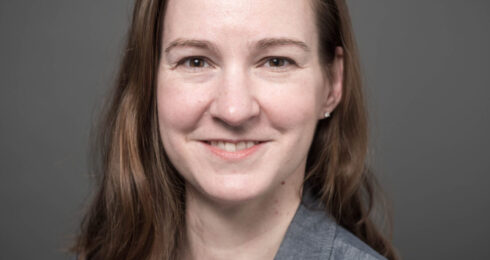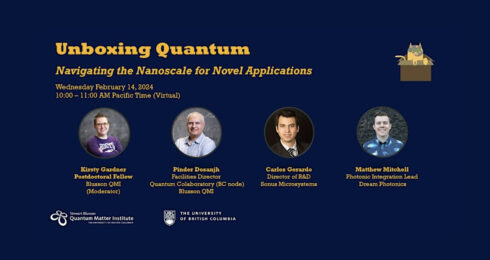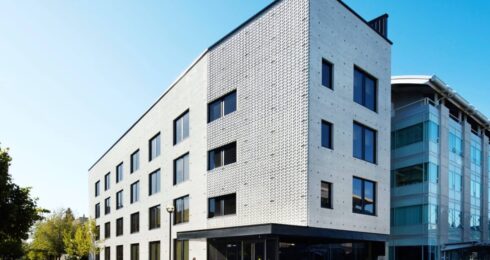The University of British Columbia hosted Frank-Walter Steinmeier, the president of Germany, as part of his first official visit to Canada on April 25, 2023.
President Steinmeier toured UBC’s soon-to-open hydrogen research platform and met researchers working on clean energy and climate change solutions, as well as members from the Stewart Blusson Quantum Matter Institute (Blusson QMI) involved in the Max Planck-UBC-UTokyo Centre for Quantum Materials.
The Max Planck-UBC-UTokyo Centre for Quantum Materials is a world-leading collaborative venture between the Max Planck Society (Germany), UBC (Canada), and the University of Tokyo (Japan) featuring internationally recognized leading scientists and extensive infrastructure for research in quantum materials.
“We were delighted to welcome President Steinmeier to UBC and to showcase our commitment to sustainable energy and advancing research that addresses climate change,” said UBC President and Vice-Chancellor Dr. Deborah Buszard. “President Steinmeier’s visit underscores the importance of international collaboration in the field of clean energy and we look forward to continued partnership with German institutions.”
“What we saw here during our visit to British Columbia is the close cooperation between science institutions at UBC and in Germany and Canada, and this is encouraging for the future,” said President Steinmeier. “Germany and Canada are working together to make the world a better place and that means changing our daily behaviour and developing innovative technology.”
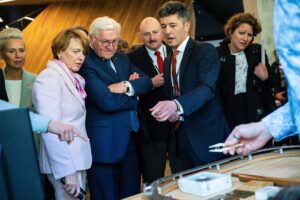
Image (left to right): Ms. Silvia Breher, Member of the Bundestag, Committee for Family Affairs, Senior Citizens, Women and Youth; First Lady Elke Büdenbender; President Frank-Walter Steinmeier; Prof. Andrea Damascelli, Blusson QMI Scientific Director; Mr. Bernd Rützel, Member of the Bundestag, Chairman of the Committee for Labor and Social Affairs; and Dr. Dörte Dinger, State Secretary, Head of the Office of the Federal President; watching a demo of superconductivity on Blusson QMI’s levitation track. Credit: Paul Joseph, UBC.
The 70-member German delegation included the Minister of Education and Research, Bettina Stark-Watzinger, First Lady Elke Büdenbender, German Ambassador to Canada Ms. Sabine Sparwasser, and representatives from parliament, business, science and culture.
They were welcomed by members of the UBC community led by Dr. Walter Mérida, applied science associate dean, research and industrial partnerships.
President Steinmeier’s visit started with a tour of the Smart Hydrogen Energy District (SHED), a unique project developed by MéridaLabs, a research group within the faculty of applied science, and projected to open later this year.
The German president and delegation members also spoke with researchers working on challenges relating to clean energy, digital manufacturing, quantum materials and smart energy storage.
As part of UBC’s research showcase, President Steinmeier attended Blusson QMI’s booth, where he was welcomed by Blusson QMI Scientific Director, Prof. Andrea Damascelli and four joint PhD students—Cissy Suen, Valentin Zimmerman, Niclas Heinsdorf, and Rafael Haenel—from UBC, the Max Planck Institute for Solid State Research, and the University of Stuttgart.
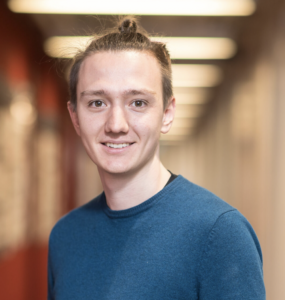
Image: Joint PhD student, Rafael Haenel.
The joint PhD program offers unparalleled opportunities to study in the fields of quantum materials and quantum materials-based devices.
The highly collaborative nature of the program exposes student scientists to a wide variety of experimental and theoretical techniques and materials systems beyond their immediate research projects, empowering them to contribute to a rapidly evolving research frontier.
“The program gives me the chance to experience a second academic environment. I get to meet interesting people and participate in cutting-edge research and collaboration between two institutes, two cultures,” said Rafael Haenel, a joint PhD student who’s part of the program between UBC, Max Planck and the University of Stuttgart.
The Blusson QMI research showcase included a demonstration of superconductivity using Blusson QMI’s levitation track by Research Associate Dr. James Day and Operations Manager Pinder Dosanjh, and a live experimental demonstration of entanglement and interference using a quantum physics science kit called ‘Quantenkoffer.’
Canada welcomes several thousand German students every year and the German visit highlights how these students can tap into opportunities to engage in top-tier research, particularly at UBC.
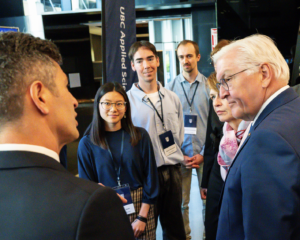
Image (left to right): Scientific Director Andrea Damascelli; joint PhD students Cissy Suen, Niclas Heinsdorf, Valentin Zimmerman; First Lady Elke Büdenbender; and President Frank-Walter Steinmeier. Credit: Paul Joseph, UBC.
To read more about President Steinmeier’s visit to UBC, please see here.
President Steinmeier’s Canada visit runs April 23-27, with stops in Ottawa, Vancouver and the Arctic. Click here for more information on the visit.
Media contact: Shahrzad (Zad) Abbasi | 604 360 6761 | shahrzad.abbasi@ubc.ca
